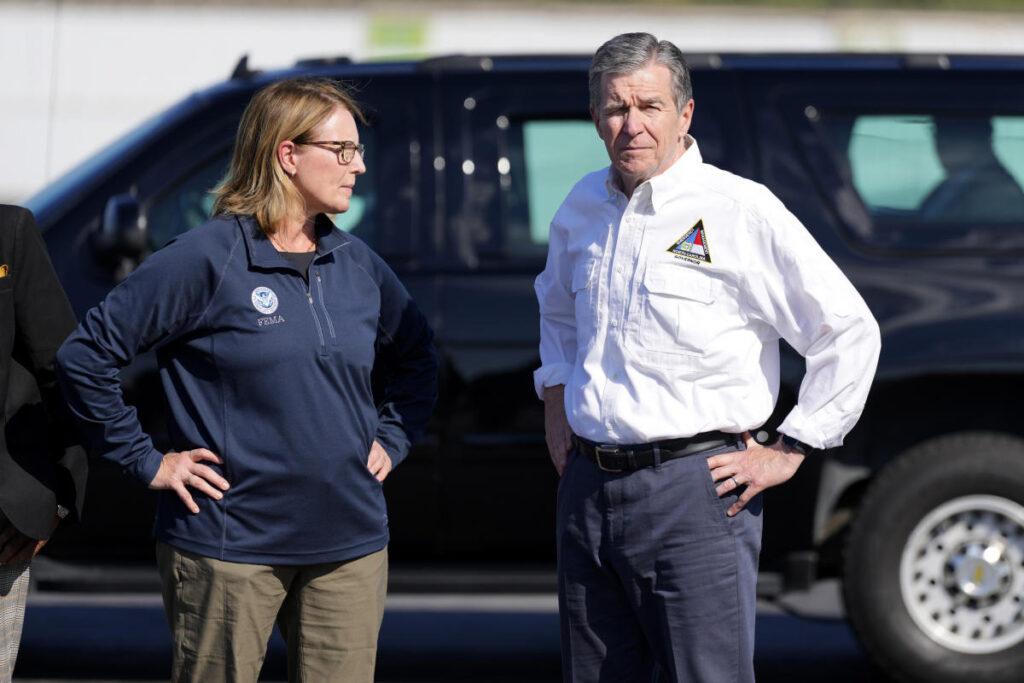RALEIGH, N.C. (AP) — North Carolina Gov. Roy Cooper on Thursday signed the state’s first relief package to address Hurricane Helene’s devastation, allocating $273 million for immediate needs and giving flexibility to agencies and displaced residents.
The Democrat signed the measure, approved unanimously Wednesday by the Republican-dominated General Assembly. Nearly all the money will serve as the state’s share that is needed to meet the federal government’s match for state and local disaster assistance programs. Other money will be used in part to ensure public-school nutrition employees at closed schools get paid and to help officials administer elections in the coming weeks in the battleground state.
“Recovery for Western North Carolina will require unprecedented help from state and federal sources and this legislation is a strong first step,” Cooper said in a news release. The legislature also agreed separately Wednesday to return to Raleigh on Oct. 24, when action on additional recovery legislation is expected.
The $273 million in Wednesday’s bill originates from the state’s savings reserve, which contained $4.75 billion. The enacted measure also waived fees for people in western counties to replace lost driver’s licenses and identification cards, as well as permitting requirements for some highway repairs and open burning of storm debris.
The General Assembly expanded rule alterations for conducting elections and turning in ballots from 13 hard-hit counties as approved by the State Board of Elections earlier this week to 25 counties with close to 1.3 million registered voters. The 25 cover nearly all of the counties under the federal disaster declaration.
Election officials are in the final stages of assessing the extent of damages at the 540 Election Day polling places in the region, State Board of Elections Executive Director Karen Brinson Bell told reporters on Thursday. Some of these voting locations may be replaced with tents, trailers or motor coaches, Bell said.
Under the new rules, voters registered in the 25 counties, for example, can request an absentee ballot in person at their county election office up until the day before Election Day — providing them with several more days for access.
The legislation also changed the options that displaced people in the region have for turning in absentee ballots. The law says absentee ballots received by voters in the 25 counties can be turned in to any open early voting site or county election office in the state, as well as to the State Board of Elections office in Raleigh.
The legislation blocked an additional option approved by the state board this week that would have let these voters drop off absentee ballots at Election Day polling places within their home county when open on Election Day, board attorney Paul Cox said Thursday.
The first absentee ballots were sent by mail to those who requested them a few days before Helene arrived in North Carolina, raising the threat that floodwaters destroyed some ballots. Mail service disruptions also could make in-person requests and returns preferable.
Friday’s statewide registration deadline to vote by mail or on Election Day remains in place, but voters already can simultaneously register to vote and cast their ballot in their home county at early voting sites open from Oct. 17 to Nov. 2.
Seventy-five of the 80 early voting sites approved for use in the 25 counties before the storm will be operating next week, Brinson Bell said. Portable restrooms, generators and internet access are still needed for a handful of sites, she added.
Brinson Bell, who lived in the mountains for 20 years, pointed out the state has operated past elections following other natural disasters and during the COVID-19 epidemic.
“To carry out this election through such devastation certainly is harder. But our processes are working, and we are just exercising what we know to do,” she said. “And that’s why we’re going to be able to deliver voting to all North Carolinians.”
Read the full article here
